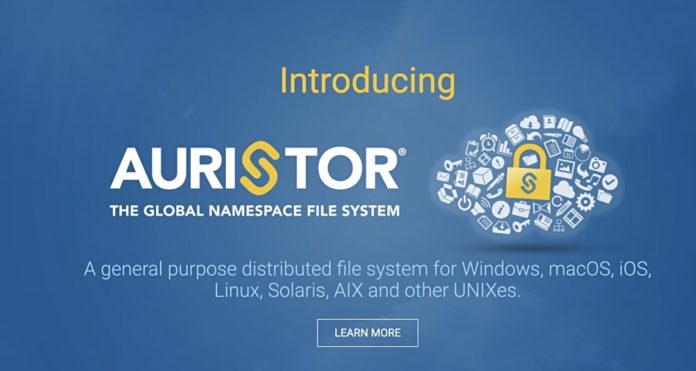Andrew File System developer AuriStor updated attendees at an IT Press Tour briefing about its work on the file system with an HPC and large enterprise customer base dating back 16 or more years.
AuriStorFS (a modern, licensed version of AFS) is a networked file system providing local access to files in a global namespace that has claimed higher performance, security and data integrity than public cloud-based file-sharing offerings such as Nasuni and Panzura.
AuriStor is a small and distributed organisation dedicated to expanding the popularity and cross-platform use of AuriStorFS.
AFS background
The Andrew File System (AFS) began life as the Andrew Project by Carnegie Mellon University, which was founded in a merger of the Carnegie Institute of Technology and the Mellon Institute of Industrial Research in 1900. The founders of these two institutes were Andrew Carnegie (steel industry magnate) and Andrew Mellon (banking magnate) — hence the eponymous Andrew Project.
AFS is a scalable client-server distributed file system, like NFS and SMB, with a global namespace, location independence, client-side caching, callback notification to clients of file system content changes, and replicated access to read-only data. It looks like a local file system on an AFS client. An AFS cell entity is one or more AFS servers and their clients forming an administrative domain.
OpenAFS is an open source implementation of AFS based on code made available by Pittsburgh-based, IBM-owned Transarc in 2000. Transarc was started up in 1989 by several Andrew Project members and IBM was an initial investor.
AuriStor

AuriStor was founded in 2007 as Your File System, Inc., by CEO Jeffrey Altman. It is a small — you might even say minute — company, with just five employees listed on LinkedIn. However it says it has a distributed team with members in its offices in New York City, Cambridge MA, Edinburgh, Scotland, and Nova Scotia, Canada.
A briefing presentation slide showed just eight contributing developers since January 2019.
AuriStor’s aim was to accelerate AFS development by selling a licensed version of AFS, and thus fund its own engineering and support effort. Its AuriStorFS is claimed to be a better cross-platform offering than Microsoft’s Windows DFS, more reliable than Gluster, as performant as GPFS, and more cost effective than Panasas for general storage needs. AuriStor wants to sell its AuriStoFS to large, medium and small enterprises, and even individuals with smartphone client software.
AuriStorFS is backwards compatible with AFS and OpenAFS. It has been certified for Red Hat Enterprise Linux 8.4, making it the only AFS-family software certified for use on any Enterprise Linux distribution. It is validated for Debian, Ubuntu, CentOS, and Oracle and AWS public cloud use. Client support includes Linux, macOS and Windows.
The AuriStorFS source code is available to licensed organisations wanting to participate in its development as part of a private community.
Competition
Here is a competitive matrix from the AuriStor website:
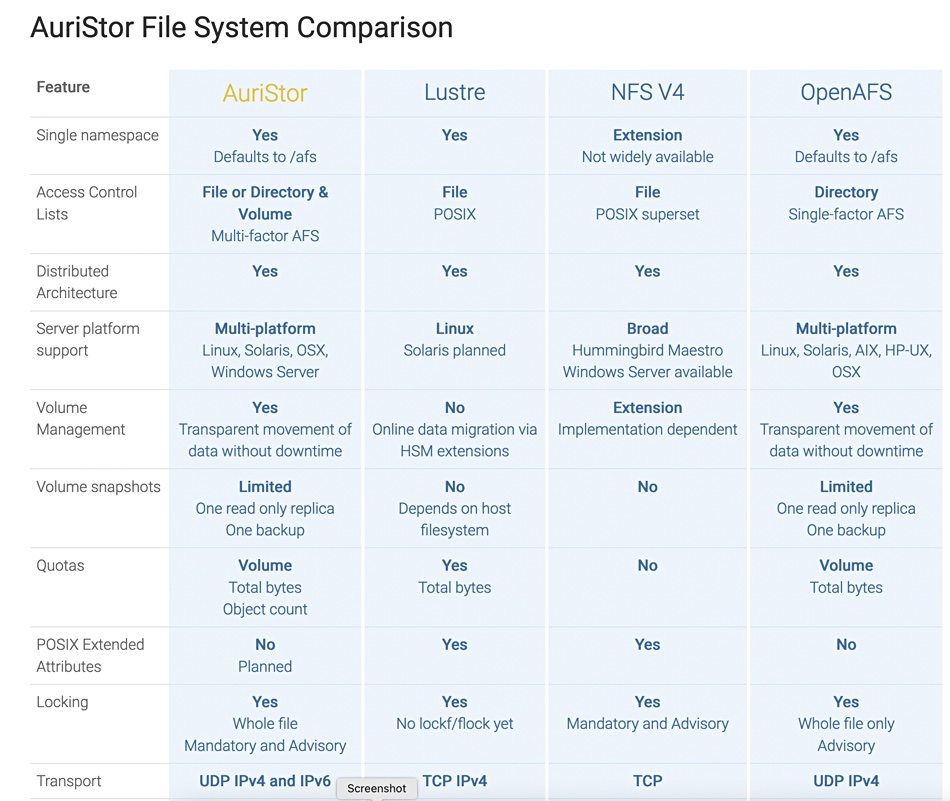
It appears to be somewhat dated. It does not include, for example, Panasas, Spectrum Scale, DAOS or WekaIO.
Scalability and performance
An AuriStor cell can store up to 2259 file streams of up to 16 exabytes — the maximum allowable distributed database size. OpenAFS tops out at 2GB — a tiny fraction of that.
The number of Volume IDs per cell is 264 — much more than the 231 limit of OpenAFS. There can be 290 objects (directories or files) per volume compared to OpenAFS’s 226.
Auristor’s timestamp granularity is 100ns which compares to OpenAFS’s 1 second.
There’s no need to go on. AuriStorFS is ridiculously more scalable than OpenAFS.
AuriStor says AuriStorFS is faster than OpenAFS and performance-competitive with Lustre, GPFS (Spectrum Scale), Panasas and NFS v4.
Customers
AFS, through IBM’s support, gained HPC and large enterprise users, such as Morgan Stanley, which in 2004 had more than 25,000 hosts in 50+ sites on six continents. Morgan Stanley said AFS could provide WAN file sharing better than NFS as it had a better client:server ratio of hundreds to one compared to NFS’s then 25:1.
At that time AFS was seen as dated, but Morgan Stanley’s investment in it made it impossible for the firm to migrate away.
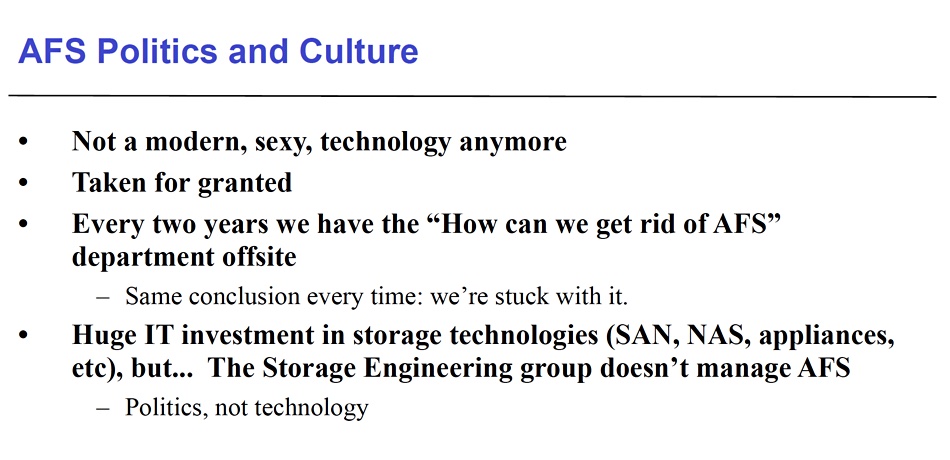
Goldman Sachs is another AFS user, and replaced its OpenAFS client with the AuriStorFS client in 2017, deploying it to 25,000 hosts — a number which has since grown. Its experience is discussed in a 2020 YouTube video by VP Core Engineering Tracy Di Marco.
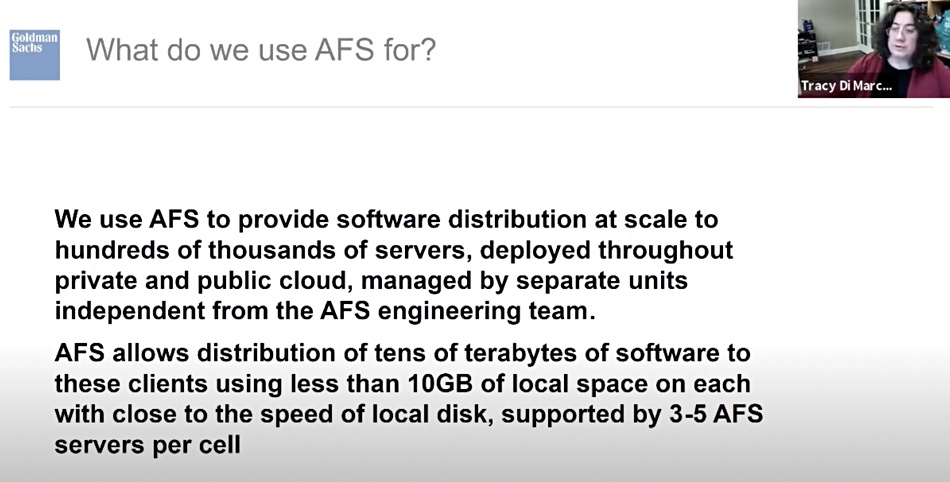
Di Marco said AuriStorFS “allows us to provide hundreds of thousands of hosts that perform business functions to the firm, at close to local disk speed, without repeated, possibly expensive, unnecessary network usage, and with a standard small disk allocation, rather than more expensive larger disks.”
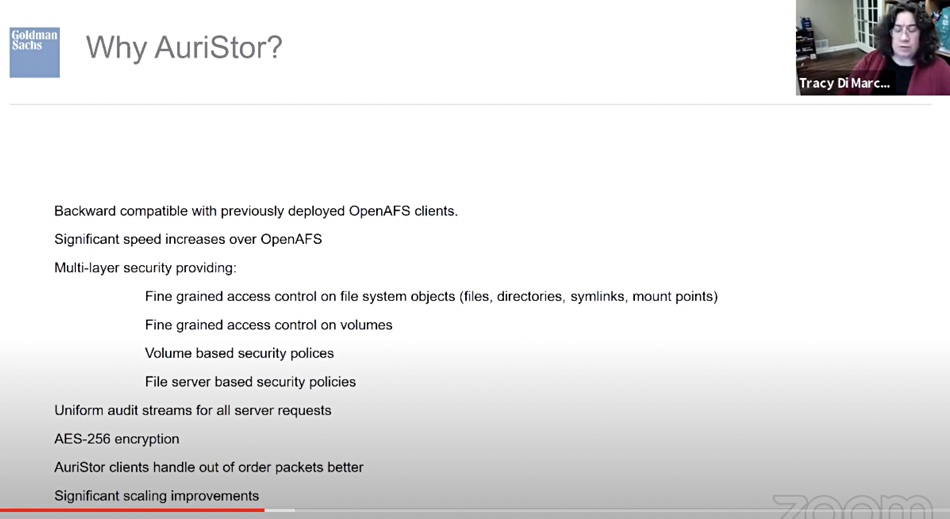
Other AuriStor customers include CERN, Intel, the IRS, Qualcomm, United and KLM airlines. We couldn’t find any HPC customers and think that the number of such is low. WekaIO, for example, has never encountered AFS, OpenAFS or AuriStor in the HPC market.
Comment
This is a niche business. AuriStor is a small business exclusively focussed on its own products and supporting a relatively small number of extremely large customers. It is funded by license sales and not by venture capitalists, making it markedly different from competing file system suppliers such as WekaIO.
The main competition facing AuriStor in our view comes from the public clouds — AWS, Azure and Google — and applications such as CTERA, Egnyte, Nasuni and Panzura. Hammerspace, with its global filesystem namespace, is another competitor.
A main focus of AuriStor marketing is to encourage its adoption by OpenAFS users. A secondary focus, in our view, is to prevent defection by its user base to the public cloud.
If it succeeds in moving down market from enterprise users with 20,000-plus servers then it will increasingly come into competition with CTERA, Egnyte, Nasuni and Panzura and may suffer from appearing more complex to install and manage than these suppliers’ products. At the same time it has more bells, whistles, levers and hooks for admin staff to use, secure and optimise it.
Pricing
The starting price for an AuriStor installation is $21,000/year for a perpetual use license with four database service and four file service instances. Additional file or database service instances within a cell start at $2,500 each and decrease to $1,000 each based upon quantity. Single server cells are licensed at a base price of $6,500.
Fact Sheet
Get a 24-page downloadable AuriStor fact sheet as a PDF from here.
See Tracy Di Marco’s “Leveraging AFS Storage Systems to Ease Global Software Deployment” presentation here and the slides here.


